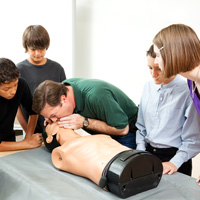
Public health officials are constantly working to inform, educate and empower communities about health issues to encourage a healthier way of life. Through educational programs, these professionals strive to inspire communities to make better health choices. There are many different strategies for effective health education in communities to promote interaction and raise awareness on the elements of health related issues. Through effective health education strategies, public health officials can make a considerable impact on the overall health and knowledge within communities.
What is Public Health?
Public Health is described as the science of protecting and improving the health of communities through education, promotion of healthy lifestyles and research for disease and injury prevention. Professionals in Public Health study health related concerns that are potentially affecting communities and work to find ways to educate individuals to avoid health risks.
This field deals with health issues impacting communities as whole. Compared to traditional medical professionals who work on an individual basis, public health officials treat communities as their patients, whether it is on a global scale or local neighborhood. Main duties of a public health official involve conducting research and sharing their findings by implementing educational programs to prevent problems from occurring.
Increasing Health Literacy
Nearly nine out of 10 adults have difficulty using everyday health information that is routinely available in health care facilities. Defined as the ability to process and understand basic health information needed to make informed health decisions, health literacy requires skills to break down that information. This involves calculating numbers to determine things such as cholesterol and sugar levels, measuring medication and understanding nutrition labels. Poor literacy skills have been associated with higher health care expenses by affecting a patient’s capability to effectively use available information to implement health behaviors or respond to health warnings.
National Action Plan
In 2010, the U.S. Department of Health and Human Services developed the National Action Plan to Improve Health Literacy with the goal of creating a society that:
- Provides everyone access to accurate, actionable health information
- Delivers person-centered health information and services
- Supports life-long learning and skills to promote good health
The Action Plan is based on the idea that each individual has the right and need to access health information that will assist in making informed decisions as well as the need for health services to be provided in a way that can be easily understood by the average citizen and beneficial in encouraging health, longevity and quality of life. The seven goals in the plan include:
- Develop and disseminate health and safety information that is accurate, accessible and actionable.
- Promote changes in the health care delivery system that improve information, communication, informed decision-making and access to health services.
- Incorporate accurate and standards-based health and developmentally appropriate health and science information and curricula into child care and education through the university level.
- Support and expand local efforts to provide adult education, English-language Instruction, and culturally and linguistically appropriate health information services in the community.
- Build partnerships, develop guidance and change policies.
- Increase basic research and the development, implementation, and evaluation of practices and interventions to improve health literacy.
- Increase the dissemination and use of evidence-based health literacy practices and interventions.
Educational and Community-Based Programs
Health educators attempt to bridge the gap between distributed information and the public by developing effective educational programs for communities to prevent disease and injury, improve health and enhance the quality of life. These programs play a key role in reaching people outside of traditional health care settings such as schools, worksites and hospitals.
For a community to effectively improve its health, changes are often needed in physical, social, organizational and political environments in order to adjust factors that could be contributing to health problems. For example, communities may need to implement new programs or policies to change community norms in order to promote better health.
These programs work to educate communities on issues such as:
- Chronic diseases
- Mental illness/behavioral health
- Unintended pregnancies
- Nutrition and obesity prevention
- Substance abuse
Through successful education programs that use proper cultural communication methods, public health professionals are able to promote policy change and advocacy for better health education in communities. Health educators are constantly working to ensure that individuals have a clear understanding of how life choices affect health status. For those interested in being involved in the education of communities to promote health education, Benedictine University offers an online Master of Public Health (MPH) with a 35-year legacy as well as a specialized certificate in Health Education and Promotion.
Related Benedictine Programs
With the proper stress management, a health care career in nursing is one of the most rewarding careers available. Benedictine University offers an online accredited Master of Science in Nursing (MSN) degree for those looking to advance their nursing careers while juggling their busy work and personal schedules. To learn more click here or talk with one of our Program Advisors today.

